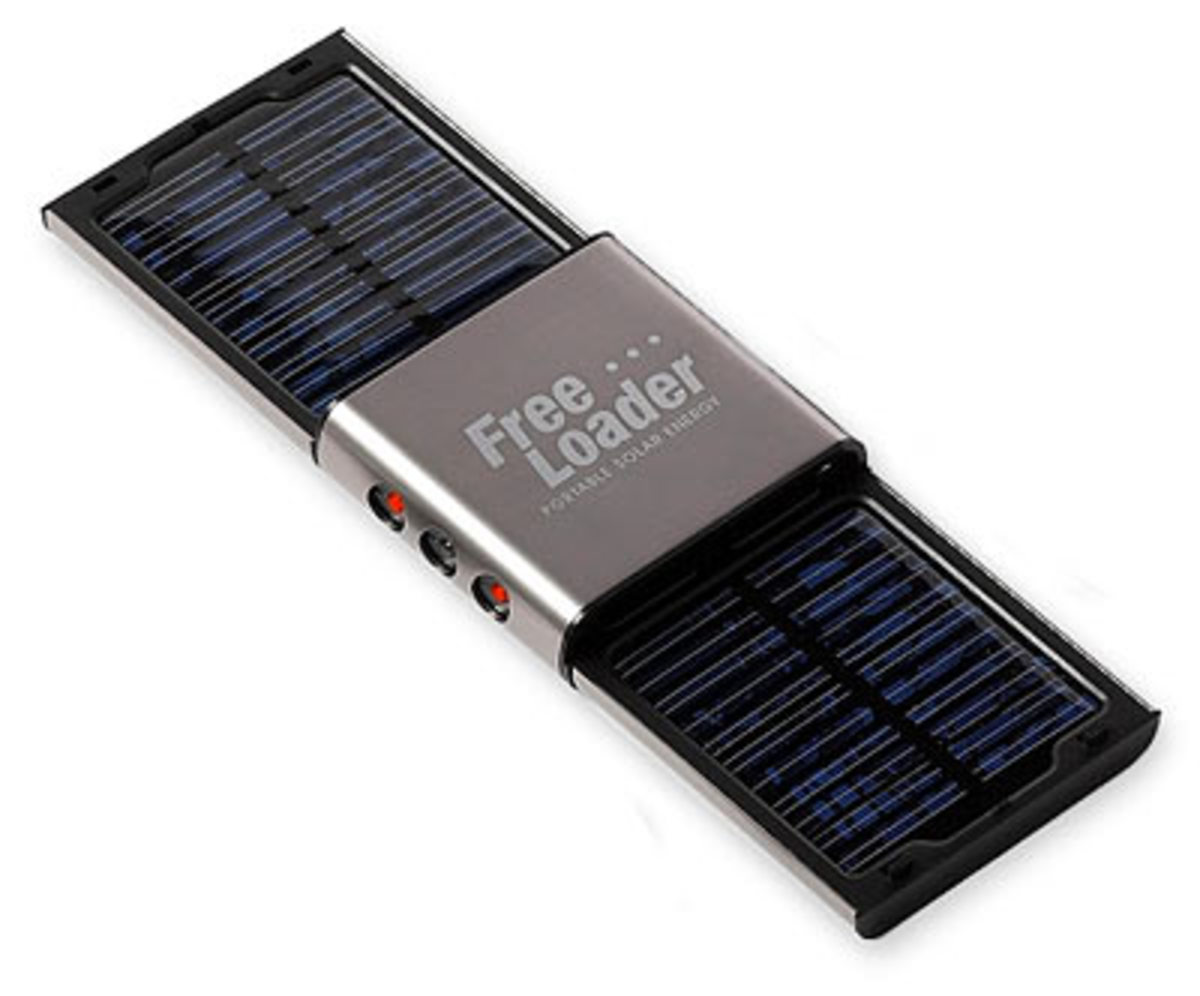Types of PV panels | Tapping solar power technology
Types of PV panels modules
There are a variety of PV panel modules on the market today. Before rushing out to tap this renewable source of energy, it'd be wise to assess the different types of solar technology out on the market today, and understand their strengths and limitations to ensure successful application to your project.

Introduction
Solar energy technology can be mainly split into two main branches - Thermal generator and Photovoltaic generator.
Thermal generation systems are collectors that converts solar radiation
into thermal energy to be stored and transported for use for room
heating or provision of hot water. This form of solar technology is
within the scope of this article.
Photovoltaic generators are solar modules that convert solar radiation
directly into electric energy. As a rule, cells are made in the form of
discs or film. The most widely employed semiconductor is silicon. A
module consist of electrically connected solar cells sealed between
suitable materials like glass, using transparent plastic sheets as
"glue".
Silicon cells typically exhibit voltages between 0.5 and 0.8V. Higher voltages are obtained by a series connection cells mainly:
parallel connection - leading to currents of cells at same voltage
series connection - leading to addition of voltages of the cells
There are three main types of solar cells on the market today - Mono
crystalline, Polycrystalline and Amorphous Silicon (Thin Film).
These consists of the 1st and 2nd generation of PV technology. The 3rd
and 4th generation of solar technology include concentrator technology
and dye sensitized solar cell technology.
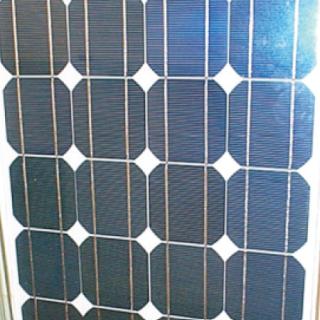
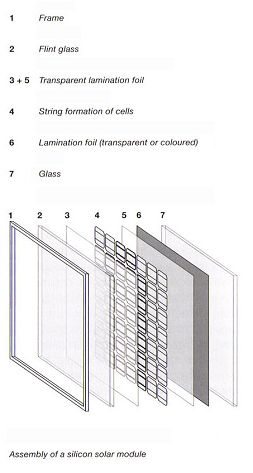
Monocystralline Silicon PV panels
Amongst the 1st generation on silicon modules, monocystralline panels
are more efficient, with a rate of 12%-18% efficiency. They are
produced in large sheets that can be cut to a specific size or used as
one large cell in a panel. They have the smallest cells and thus the
smallest panels for a required wattage. The drawback is that they are
also more expensive to produce than polycrystalline panels.
Application: Monocyrstalline panels fare well in areas with unblocked
direct radiation and cooler temperatures. Orientation is critical to
the setup of the system as partial shading or blockage would result in
a greater than proportional drop in efficiency. For example, if 20% of
the setup is shaded, efficiency will drop by more than 20%. Higher
temperatures would also lead to a decline in cell efficiency.

Polycystalline (Multicrystalline) Silicon PV panels
Polycrystalline panels use a series of cells in place of the single
large cell used in monocrystalline panels. Polycrystalline
photovoltaics are less expensive than monocrystalline panels but have a
lower efficiency of 11-16%. As a result, the panel sizes are larger
than monocrystalline panels for an equivalent wattage.
Application: Polycrystalline panels perform better in areas of direct
sunlight. Similar to monocrystalline panels, they suffer a
disproportionate drop in efficiency due to overshading. High
temperatures (panels can heat up to over 70 degrees celsius during the
day) would also reduce the efficiency of the panel.
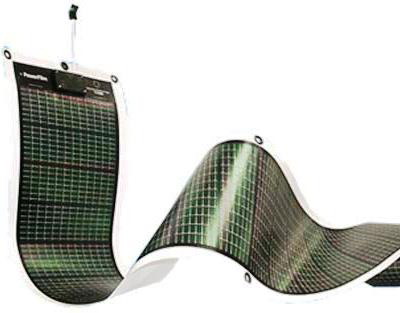
Amorphous Silicon Thin Film Technology
Amorphous silicon is the 2nd generation of PV technology. It has no
crystalline structure and can be applied as a thin semiconductor film
on different materials, hence the name "Thin Film". In addition to
silicon, copper indium diselenide (CIS) and cadmium telluride (CdTe)
are used
The advantage of thin-film panels lies in the low manufacturing costs
and versatility. They are less time consuming and expensive to make. As
they can be applied in thin layers to different materials, it is
possible to make curved shaped, or unusually sized panels. The drawback
is that they give a lower efficiency rate of about 5-7%.
Application: Thin FIlm technology works well with both direct and
diffused radiation. Hence they are suitable to be applied in shady
areas with no drastic loss of efficiency. This also means that they are
more suitable for application to vertical building elements like walls
on buildings. Higher heat temperatures also do not affect them as
adversely.
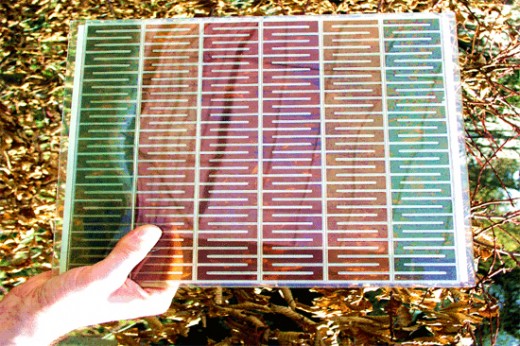
Developing technologies - Concentrators and Dye sensitized solar cells (DSSC)
Developing technologies that are still uncommon on the mass market are
concentrator technologies and DSSC setups. These mark the 3rd and 4th
generation of PV technologies that are being developed.
Concentrator technologies, by their name, uses a variety of tracking
mechanisms and lenses to orientate the cell to the direction of the
sun. This would ensure that the cell is at optimal orientation to
receive the most optimal amount of direct radiation. A series of lenses
then focuses the radiation onto a small area, thus it requires less
cells to produce an equivalent amount of wattage. Efficiency of such
systems are very high at 20-30%, but involve significant start-up and
maintenance costs.
DSSC cells are another class of low cost thin film solar cells that are
in development. They use low cost materials and are relatively easy to
produce in bulk. They are a very promising category of solar cells due
to their potential price -performance ratio for them to compete with
traditional fossil fuels. Currently, there are mass market production
of DSSC but they are not as widespread.
The future of renewables
How soon will solar power become a major source of renewable energy?
Related Hubs
- Outdoor Thermal Comfort | An Overview
- Underrated Green Design Strategies
- Dubious Green Technology | Some really bad ideas to save the World
- Regenerative Architecture | Beyond Sustainability - Design to Actively Heal the Environment
- Trophies
Ander Marketing - Acrylic, Crystal & Glass Awards, Trophies, Medals, Plaques, Common Seals and Corporate Gifts Singapore









